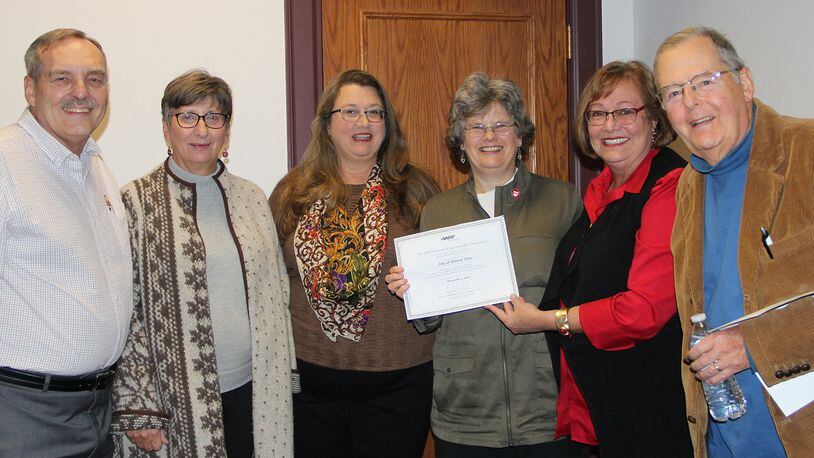MORE: Former Middletown senior center may become BMW motorcycle dealership
Ann Whelpton, one of the coordinators of the local network, said several focus groups discussed the city’s needs with regard to an aging population in 2013 and a group then held a meeting to discuss what to do with the information collected and what to do next.
The answer was to get the community more involved which led to forming a steering committee to look at various issues related to the topic of providing for services and amenities needed as the population ages. Related to that, however, was the need for improvement in areas which affect people of all ages.
The letter notifying the city of acceptance into the AARP network called attention to that. Written by Nancy LeaMond, the executive vice president of community, state and national affairs for AARP, the letter to Mayor Kate Rousmaniere reads in part:
“Congratulations to the City of Oxford, Ohio for becoming the 191st community to enroll in the AARP Network of Age-Friendly Communities … The Network encourages communities to take action and pay increased attention to the environmental, economic and social features that encourage great age integration and diversity and create a community that supports residents from the cradle through retirement.”
MORE: Oxford joins coalition planning litigation against state
The letter was read by steering committee member Jessie Leek at Council, noting the AARP Network of Age-Friendly Communities was started in April 2012 as an independent affiliate of the World Health Organization’s Age-Friendly Cities and Communities Program, an international effort launched in 2006 to help cities prepare for the growth of the older adult population.
Whelpton reminded Council members and the community the age-friendly network looks at eight “domains” as the keys to making a community more livable for those of all ages.
The eight domains listed by AARP and WHO as crucial to living in a community are:
• Outdoor Spaces and Buildings – “Parks, sidewalks, safe streets, outdoor seating and accessible buildings (think elevators, stairs with railings, etc.) can be used and enjoyed by people of all ages.”
• Transportation – “Public transit options can be as expansive as a train system or as targeted as a taxi service that provides non-drivers with rides to and from a doctor’s office.”
• Housing – “Most older adults want to age in place. Doing so is possible if homes are appropriately designed or modified – and if a community includes affordable housing options for varying life stages.”
• Social Participation – “Isolation can be combatted by the availability of accessible, affordable and fun social activities.”
• Respect and Social Inclusion – “Intergenerational activities are a great way for young and old to learn from one another, honor what each has to offer and, at the same time, feel good about themselves.”
• Civic Participation and Engagement – “An age-friendly community provides ways older people can, if they choose to, work for pay, volunteer their skills and be actively engaged in community life.”
• Communication and Information – “Age-friendly communities recognize that not everyone has a smartphone or internet access and that information needs to be disseminated through a variety of means.”
• Community and Health Services – “While it’s important that care be available nearby, it’s essential that residents are able to access and afford the services required.”
MORE: Meet the ‘quintuplets’ of Miami University
Whelpton said the Miami University Scripps Gerontology Center, under the leadership of Dr. Suzanne Kunkel, is already at work on a needs assessment for the local work and the steering committee will shore up the task force with plans for a community forum in January and a formal launch Feb. 1.
She also said the local effort will be helped by Nicole Ware, of Cincinnati, an associate director for AARP in Ohio, who will mentor the Oxford leadership.
Rousmaniere noted the city and staff have had a hand in the project so far, submitting the formal application, and offered help with anything they can do.
Council member Edna Southard praised the work of the committee.
“This is a great collaboration of many parts of our community,” she said. “We have heard a lot about transportation and affordable housing in the past few months.”
About the Author
